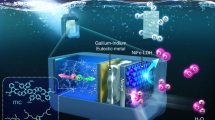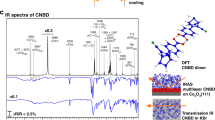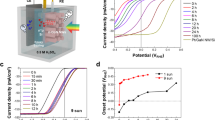Abstract
THE PEC1 has acquired popularity among researchers in the past years, mainly because of its possible use in solar energy conversion2,3. The major problem at present is to find a semiconductor electrode with an optical band gap (written as just band gap below) small enough to allow it to absorb a reasonably large portion of the solar spectrum, and at the same time being stable against photocorrosion. We here report that WO3 meets these criteria although it is not very efficient at solar wavelengths.
This is a preview of subscription content, access via your institution
Access options
Subscribe to this journal
Receive 51 print issues and online access
$199.00 per year
only $3.90 per issue
Buy this article
- Purchase on Springer Link
- Instant access to full article PDF
Prices may be subject to local taxes which are calculated during checkout
Similar content being viewed by others
References
Fujishima, A., and Honda, K., Nature, 238, 37–38 (1972).
Jayadevaiah, T. S., Appl. Phys. Lett., 25, 399–400 (1974).
Gerischer, H., J. Electroanalyt. Chem., 58, 263–274 (1975).
Nozik, A. J., Nature, 267, 383–386 (1975).
Author information
Authors and Affiliations
Rights and permissions
About this article
Cite this article
HODES, G., CAHEN, D. & MANASSEN, J. Tungsten trioxide as a photoanode for a photoelectrochemical cell (PEC). Nature 260, 312–313 (1976). https://doi.org/10.1038/260312a0
Received:
Accepted:
Issue Date:
DOI: https://doi.org/10.1038/260312a0
This article is cited by
-
Applications of graphene-based tungsten oxide nanocomposites: a review
Journal of Nanostructure in Chemistry (2023)
-
A review article based on composite graphene @tungsten oxide thin films for various applications
Tungsten (2023)
-
Disentangling charge carrier from photothermal effects in plasmonic metal nanostructures
Nature Communications (2019)
-
Recent progress of tungsten- and molybdenum-based semiconductor materials for solar-hydrogen production
Tungsten (2019)
-
Recent Progress in Photoelectrochemical Water Splitting Activity of WO3 Photoanodes
Topics in Catalysis (2018)
Comments
By submitting a comment you agree to abide by our Terms and Community Guidelines. If you find something abusive or that does not comply with our terms or guidelines please flag it as inappropriate.



